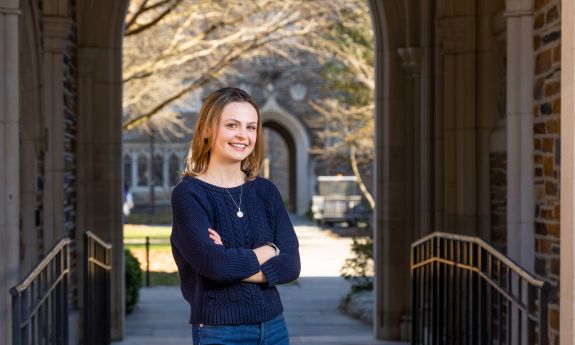Coming Soon: A Duke Dorm for Big Ideas
A new living-learning community will push students to discuss ideas outside their personal bubbles

In an age when civil discourse and 'agreeing to disagree' seem like lost arts, Duke students can choose this fall to live in a community intended to foster those skills.
A new Living-Learning Community for Transformative Ideas will house about 35 students in Kilgo Quad on Duke’s West Campus. With meeting spaces that can host up to 75, this new program will bring students together who are actively looking to explore ideas different from their own, said faculty sponsor, Jed Atkins.
“This is about having students take the lead in creating a space where students are welcomed and encouraged across all their differences – political, religious and other – to think about the questions that really matter,” said Atkins, a professor of classical studies.
The program is under Duke’s new QuadEx living/learning initiative and spins out of the Transformative Ideas program – a series of courses specifically for sophomores that encourage discussion in and outside the classroom on broad, sweeping topics. (For example: One class examines what leads to human flourishing and how religion shapes a person’s answers to life’s big questions; another analyzes the intersection of science and society.)
QuadEx also supports one of the pillars of Duke President Vincent Price’s strategic framework – building a renewed campus community.
Most students living in the new residential community will have taken Transformative Ideas courses; upper-class Transformative Ideas student fellows will lead discussions on similar topics and host speakers and other events in the residence hall related to those topics.
As word of this new program spreads, Atkins said he’s getting a lot of inquiries from students looking to live in a place where all ideas are welcome and able to be explored.
“The demands on student lives are so intense, as is the pressure to perform,” said Atkins, who directs the Transformative Ideas program. “What they’re looking for is a space where they don’t have pressures to perform. A welcoming space where they can say, ‘I don’t know,’ and to raise questions. They might be looking for adequate ethical frameworks and philosophies to live their lives, a place where they can reflect on life‘s purposes.”
You start to see students shift their opinions, or get into places of uncertainty. I think that's really good because there's a willingness to seek the truth about themselves and the world."
Professor Jed Atkins, on the impact of the Transformative Ideas courses on students.
The Transformative Ideas courses tend to get students talking about ideas they may not have pondered previously, Atkins said. Sometimes, students change their views significantly.
“You start to see students shift their opinions, or get into places of uncertainty. I think that’s really good because there’s a willingness to seek the truth about themselves and the world,” he said. “My job isn’t to shift a student to a different viewpoint or deconstruct their beliefs. My job is to give them an opportunity to step outside their current beliefs and consider larger perspectives. It can lead to people changing their minds. It can lead to people more deeply embracing their views. Or it can even lead people to be less sure about their beliefs on a particular topic, and that’s OK.”
The Transformative Ideas courses let students dive deep on big topics and attack them from a lot of angles, said sophomore Kate Donofrio, who took a course called “The Good Life” in the fall. It examined how religion, philosophy and spirituality aided people pondering life’s biggest questions and featured Duke scholars with expertise in six different religions.
“You didn’t really have to take notes,” she said. “I saw a lot of students really genuinely listening. You could just be immersed in this new world. It was a totally different type of thinking.”
In the fall of 2023, Donofrio will be one of the new Transformative Ideas Fellows, where she’ll help plan events and discussions for fellow students. The venture appeals to her and others, she said, because it offers a space for students who are often, by their sophomore years, beginning to get pinned into the requirements of the major they’re about to declare.
“When you’re a sophomore, people are declaring majors and there’s pressure to perform,” said Donofrio, a political science major from New York City. “Everyone comes to college and wants to develop deeper personal meaning. But maybe the personal opportunities for that within your major aren’t really there.”
While some students will come to the community eager to discuss politics or religion or other touchpoint cultural issues, many others will come simply seeking a place that requires civility and respect as a community starting point, Donofrio said.
The living-learning community has three civil discourse principles underlying it that its members will follow – freedom, charity and humility. These are intended to create a foundation for civil conversation.
“The ideas we discuss can be really broad or narrow. What it comes down to is civil discourse – how we have conversations,” Donofrio said. “It can attract a broad pool of people because a lot of people are looking for guidance or wisdom to take from their undergraduate experience. The civil discourse component gets everyone on the same page and makes everyone comfortable expressing their opinion.”